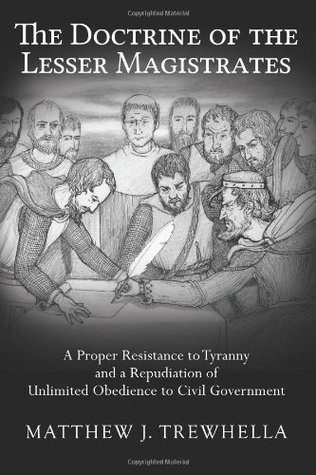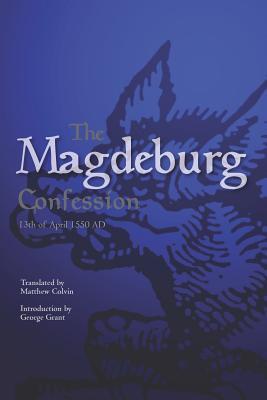This month the book of the month is a brace of books. You should get them together, and read them both. Together they address the central political issue of our day, one that rests underneath whatever the turmoil of the moment might be.
The doctrine of the lesser magistrates is one of our lost doctrines, an essential part of our civic heritage, but one which we have shamefully neglected and now are in desperate need of again. We are not going to get it back unless we resort to the reading of old books, and books that recover old doctrines. After urging you to get and read these two books, I will add a few thoughts of my own below.
The Doctrine of the Lesser Magistrates by Matthew Trewhella is a very fine introduction to what was once a standard understanding among conservative Protestants. Calvin treats this doctrine in Book IV of his Institutes, and John Knox has a clear-headed treatment of it in his Appellation. In this book, Trewhella gathers together the basic questions that surround the doctrine, and answers them systematically. What is the doctrine? What are some historical examples? Can the doctrine be abused? And so on.
A companion volume, The Magdeburg Confession, is a book that contains the testimony of some faithful Lutheran pastors in 1550, when they were facing down the attempted tyranny of Charles V. A very capable translation of their testimony is here rendered by Dr. Matthew Colvin, and it shows us that the perennial issues are indeed perennial. These were the men who withstood a siege of the city of Magdeburg for the sake of liberty of conscience, and anyone today who has ever enjoyed any measure of such liberty should render their thanks to God for these faithful servants. Chief among them was Nicolas von Amsdorff, a close friend of Martin Luther. These were the times when we had pastors with titanium spines — in distinction from what we have too much of today, which is pastors with spines molded out of saturated paper towels.
Here is the doctrine, in a nutshell.
“The primary duty of the lesser magistrates regarding the doctrine of the lesser magistrates is threefold. First, they are to oppose and resist any laws or edicts from the higher authority that contravene the law or Word of God. Second, they are to protect the person, liberty, and property of those who reside within their jurisdiction from any unjust or immoral laws or actions by the higher authority. Third, they are not to implement any laws or decrees made by the higher authority that violate the Constitution, and if necessary, resist them” (p. 15).
In short, this is civil disobedience by officials, acting in an official capacity. Moreover, it involves officials doing so with a clean conscience. When they interpose themselves between the people and the tyrannical power above them both, they are not acting lawlessly. Quite the reverse. They continue to act lawfully, even when the head has become lawless.
The issues involved extend down into matters of individual civil disobedience, to be sure, but one of the reasons resistance at that level is not as effective as it could be is that officials with actual resources for effective resistance do not interpose as they ought to.
There are many practical questions. Who decides? By what standard do they decide? Who decides if their decision was a good one? And so on. But the fact that godly resistance to tyranny generates many questions is not an argument against it. Submission to tyranny generates many more questions, mostly insoluble, and with no opportunity even to ask them.
This is a fallen world, which means that no human authority is absolute. All authorities must be checked and bounded, and a crucial part of the boundary for such authorities is found in the authorities beneath them. When evil rules, “I was only following orders” is not an adequate defense. But if it is not an adequate defense, then we have to go back to the practical questions listed in the previous paragraph.
Fortunately, we are not the first generation ever to face these particular dilemmas. We as a people have wrestled with these questions for centuries, and we have a well developed theology that addresses what we ought to do. This theology is found in books, and these are books we must read, and get others to read.
Constitutional freedoms are not kept alive on pieces of paper. They are kept alive in the hearts and minds of people who have been set free by Christ.




Thank you and God bless you.
Looks like Mr. Trewhella also has a website that might be of interest to some.
I long for the day when American pastors cease to be entertainers and chose to be men of conviction. Thank you.
BJ
@Valerie
Thank you, bookmarked.
Thanks pastor, just began a mental list of government departments we need protection from and realised its only a matter of priority, it’s triage time. I’ve got my reading cut out for me.
See our website for details. Pastor Trewhella will be preaching our 5th Election Sermon in our State House in Helena, Montana Sunday Jan 2nd. He will be speaking across the state the following week. In Plains on Tue night and Missoula Wed. late afternoon. If any of you Idahoans can make it over, we will greet you with gladness. We wonder why the tradition of preaching to the civil magistrate is not happing in Idaho but we can discuss that later if any one is so inclined. Blessings Neighbor!
Steve Wagner
Founder / Director of Project Liberty Tree
Doug, Thanks for bringing these modern writers to light. As you know, I’m an original source guy and most folks don’t take the time to digest the roots from the many leafs of the great works of the Reformation. I have read The Magdeburg Confession in another source reference and it is a great read. I’ll have to add these suggestions to my library. The interesting aspect of the discussion and doctrine, when followed to its roots in our modern polity, is extensible to the Precinct Committee Person. A PC or PCO, acronym according to ones State, is the lowest… Read more »
Steve Wagner: http://www.canonwired.com/featured/1677/
@ Tom N: thanks for the encouragement. I’ve been a PCP in Oregon the last few years and have frankly kind of been barely involved. I remotely sensed there was the kind of opportunity you allude to but will consider a more involved approach in the future. And thanks also to Pastor Wilson for great read recommendations.